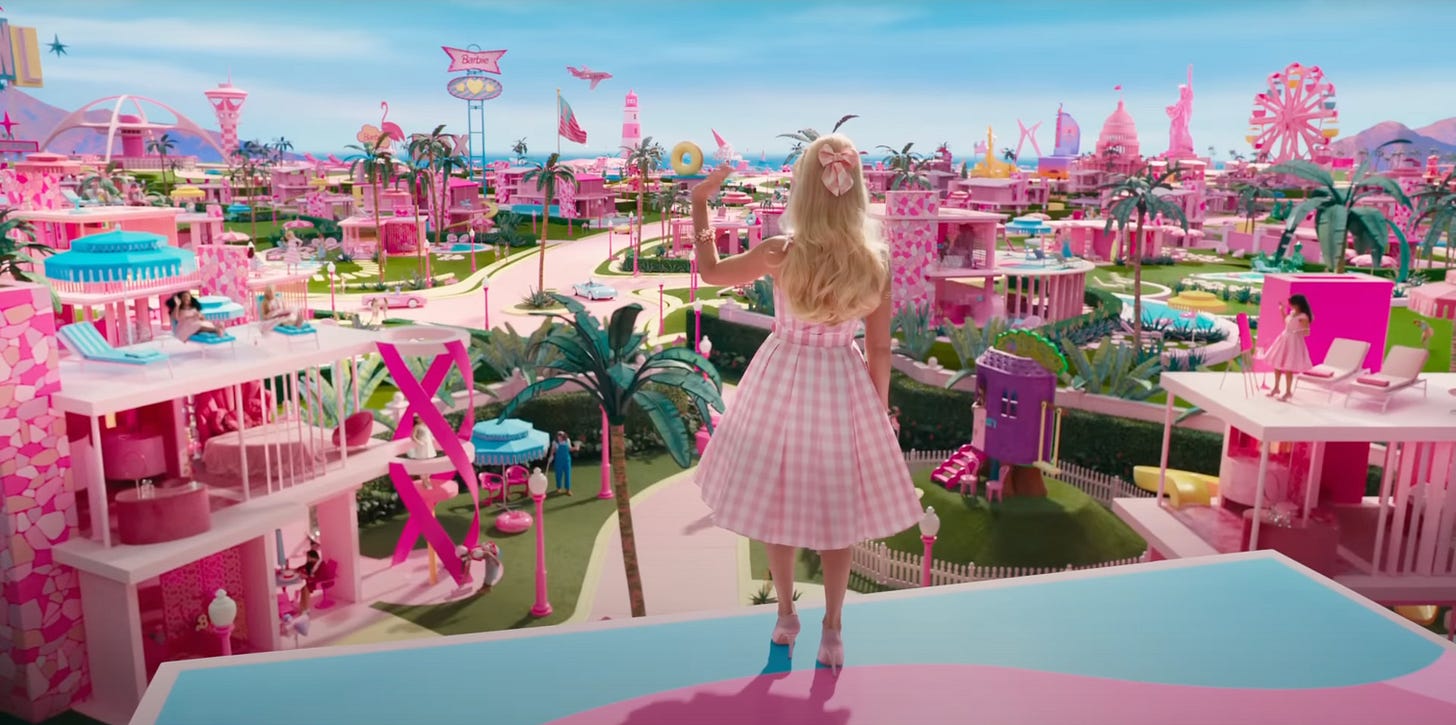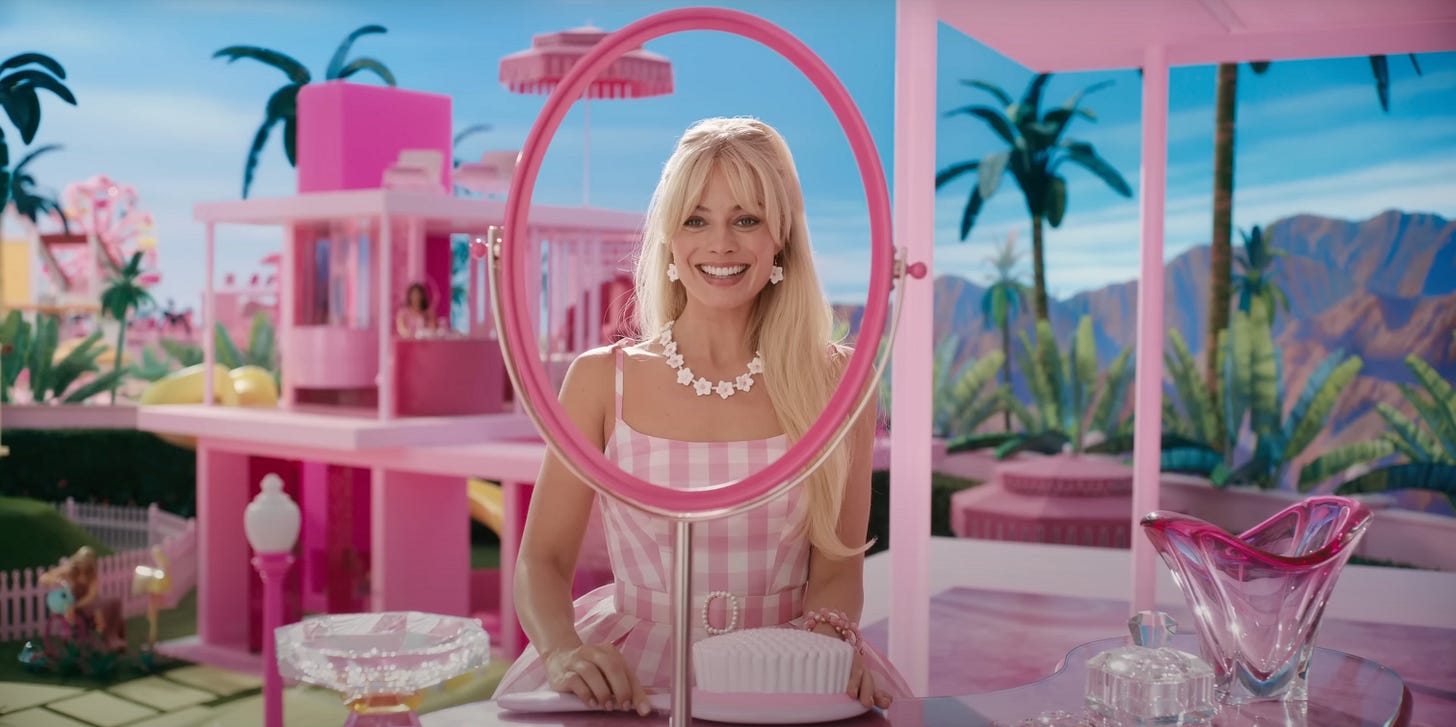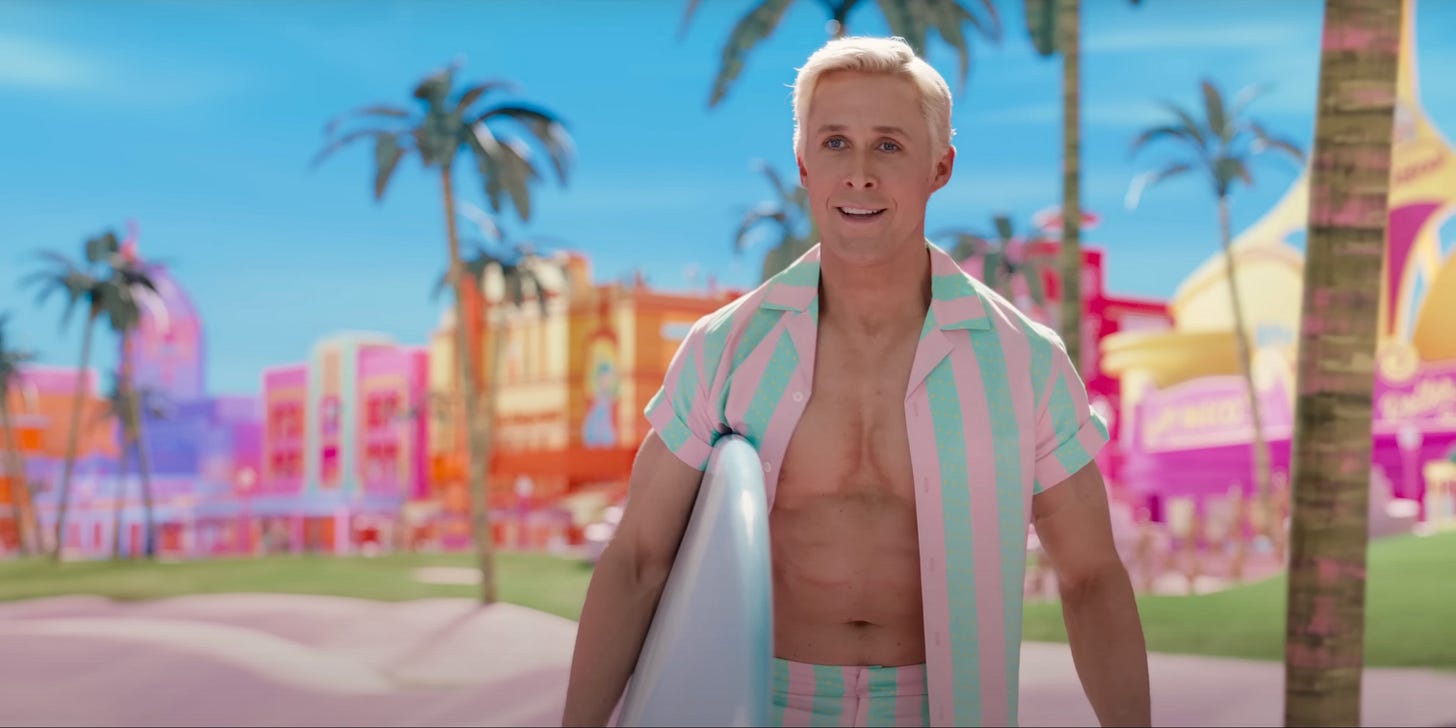Review: "Barbie" finds Greta Gerwig and Margot Robbie playing by their own rules
I'm a Barbie critic in a Barbie world
At this point in the history of Hollywood, it is more or less inevitable that any director who has made a name for themselves with smaller, ‘artsier’ personal statements will have to do at least a round or two in the tentpole space, helming a film built around a major brand or intellectual property, usually funneled into the Marvel or DC factory. That’s just where the money and the attention is right now, and even someone as ludicrously, singularly talented as the great Greta Gerwig – director of my #1 favorite movie of 2017 (Lady Bird) and #4 favorite of 2019 (Little Women) – isn’t immune to those gravitational forces.
Otherwise, though? Gerwig is playing by her own damn rules, because I’m not sure anyone in recent memory has made the jump as gracefully as she has with Barbie, nor as fully on their own terms. This is a big production built around one of the world’s best-known brands and financed by multiple multinational corporations, and not only has Gerwig made something incredibly singular out of it – a film that looks and moves and feels a little unlike anything else playing in multiplexes this year – but she has done so in a package that is, like her first two films, decidedly, proudly, and defiantly feminine, an elaborate and expensive blockbuster made by and for women, with no hint of apology or trepidation.
It is also feminist, political and pointedly so, a film that explicitly satirizes and attacks the concept of patriarchy while examining the gap between the plastic vision of women’s empowerment sold in the hermetically-sealed world of Barbie dolls and the brutal reality of a world where women are legally and culturally barred from positions of power while seeing their basic rights rolled back. Gerwig’s Barbie is going to light the heads of far-right faux-intellectual dipshits like Ben Shapiro ablaze, and for once, it won’t be because of some made-up controversy they invented out of thin air to feed their insatiable thirst for anger and attention, but because the film is taking aim directly at them and the broken world their deep-seated inadequacy profits from, at the noxious air they breathe. That Gerwig’s film does so with a smile on its face, a spring in its step, and a go-for-broke attitude towards entertaining its audience will infuriate these people all the more, because their worldview does not and cannot allow for the kind of joy Gerwig conjures and invites here.
And what joy it is. Barbie is a pleasure of writing and performance, of comic timing and zany invention, of fourth-wall breaking and winking, good-natured nods at the wonderful absurdity of its own irrational enterprise (in an era of multiverse stories and complicated shared continuities, I genuinely love the abandon with which Barbie refuses to explain the construction of its strange parallel worlds, and the delightfully playful visuals it uses to link them together). The film is not only consistently funny, but the rare comedy that gets bigger laughs the further it goes, until all the Ken characters are doing an increasingly elaborate musical number and nobody in the theater can easily breathe for laughing so hard. I would say be sure to see this with the biggest and most engaged audience you can find, but I don’t think that will prove difficult, since it seems this film is poised to become a phenomenon (I don’t know the last time I saw a 3:30 PM Thursday preview with a completely sold-out audience).
The film is also an immense tactile pleasure, a coup of production and costume design I desperately hope the Academy Awards are smart enough to reward early next year, but I fear is too slathered in too many shades of pink for an awards body that’s generally allergic to femininity. Their loss – the sets here are such a delight, not just because they are big and physical and tangible in a time when Hollywood is increasingly shooting movies in front of blurry LED walls, but because they are so blissfully artificial, every dream house and vehicle constructed with the materials and spatial logic of actual dollhouses and toys. There are moments that even recall the films of Georges Méliès, like A Trip to the Moon, in the crowded layering of cardboard and plastic and big expressive matte paintings, all of it real and none of it realistic, a space of play for the imagination to run wild.
As much attention as Gerwig rightfully deserves here, Barbie can and should also be read through the actor-auteurist lens of Margot Robbie. In a time when movie stars are either an endangered or extinct species – it depends who you ask – Robbie has spent the last decade carving out a space of stardom entirely on her own terms, working also as a producer with a great eye for projects and a wildly savvy sense of her own image. Barbie is a remarkable culmination of that project. This is a role only a genuine, old-fashioned movie star with weapons-grade charisma and singular screen presence could embody, and that only a truly talented actor with deep wells of humanity could sell in those moments Gerwig pushes things into more introspective territory. The film is peppered with these small, striking moments of female fellowship, as when Barbie sees an older woman for the first time and almost involuntarily tells her she’s beautiful; few actors could go as big as Barbie gets in its most madcap moments and also ratchet back down for an exchange that small and immediate and quietly existential.
Robbie’s work only gets more complicated and impressive as the film goes on, as she gradually segues her ‘stereotypical Barbie’ out of the space of iconography and towards the messiness of humanity. The film’s big climactic gesture here is easily its most extraordinary: A symbolic (or maybe just literal) confrontation with God where Barbie confronts the emotive core of the human experience, which Gerwig communicates through superimpositions of home movies and found footage – the exact kind of personally expressive indie-film move Gerwig and co-writer Noah Baumbach cut their teeth on, and which they have now smuggled Trojan-horse style into thousands of multiplexes around the world. It’s not only the film’s most interesting, astonishing moment, but the one in which Robbie the star/producer and Gerwig the writer/director are most clearly meeting one another on even footing, each empowering the other to go for broke.
Ryan Gosling, meanwhile, has torn up the marketing circuit for this film, both online and off, as a sort of spectacular ur-version of the beautiful brainless himbo. His rendition of Ken does indeed fit that description, but it also goes quite a bit farther. Ken is neither Barbie’s love interest nor even her sidekick here, but in actuality the film’s antagonist, a deeply insecure guy who learns about patriarchy after travelling to the real world and decides it must be the answer to the hole in his heart. The moment the film plays its hand here is when the entire project really starts clicking into place, and the action of the final half revolves around Barbie and her companions’ efforts to confront the intellectual poison Ken has spread back in Barbieland. There is a lot of goofiness in that quest, of course, and a lot of very funny needling at male insecurities; there’s a joke about dudes who are too into the Snyder cut of Justice League that just about made me choke on my laughter, which is quickly followed by one about guys who are really into explaining the genius of The Godfather (I very much felt implicated that one). But the thing right-wing idiots whinging on the internet are never going to allow themselves to see in this film is that, within this story and those gags, Barbie is also deeply loving and empathetic towards men – that one of Gerwig’s essential gestures here is to turn towards the boys in the audience and say “hey, you know it’s okay if you don’t have your shit figured out either, right? It’s okay to just be you – you don’t have to be a tool of the patriarchy either.”
That said – it still bears stating that I, a 30-year-old more-or-less straight guy who never played with Barbie dolls, am not the target audience for this film. And that’s not just okay – it’s essential to the film’s strength, to its rock-solid sense of self. One of the foremost pleasures of teaching the 2000-level Intro to Film Theory course this spring at the University of Iowa was seeing how much sheer enthusiasm so many of the young women in my class had for Greta Gerwig and her films. I had my students pick their own movies to write papers about, and not only were Lady Bird and Little Women popular picks, but they were discussed with a real present-tense sense of excitement, in which it was abundantly clear how much Gerwig’s career has meant to those coming up behind her (one student even asked if they could write just about the Barbie teaser trailer, such was their interest in Gerwig’s status as a budding auteur – it actually made for a really good paper!). Barbie is for them, among many others, an affirmation in the hope that this industry, even at its biggest and most brazenly commercial, can also be by and for women in ways meaningful and personal – that in a time when so many voices are being drowned out, Gerwig can make hers heard on the biggest stage imaginable. I love this movie, but I love that idea even more.
Support the show at Ko-fi ☕️ https://ko-fi.com/weeklystuff
Subscribe to JAPANIMATION STATION, our sister series about the wide, wacky world of anime: https://www.youtube.com/c/japanimationstation
Explore our archives and subscribe to The Weekly Stuff Podcast on all podcasting platforms: https://weeklystuffpodcast.com




